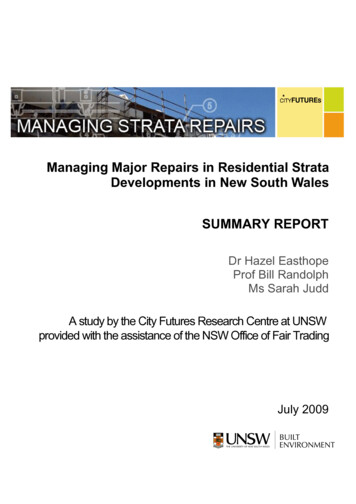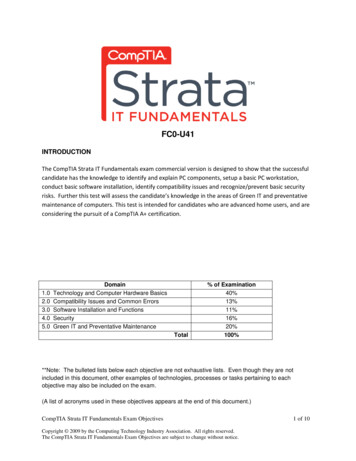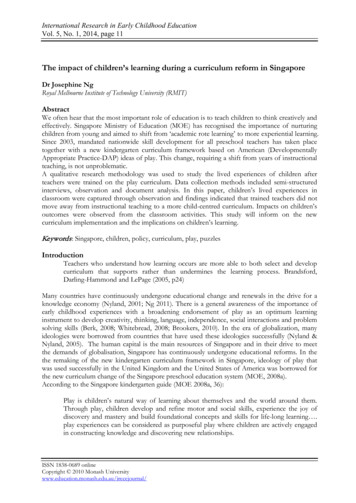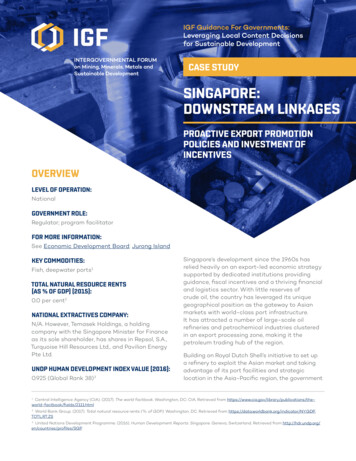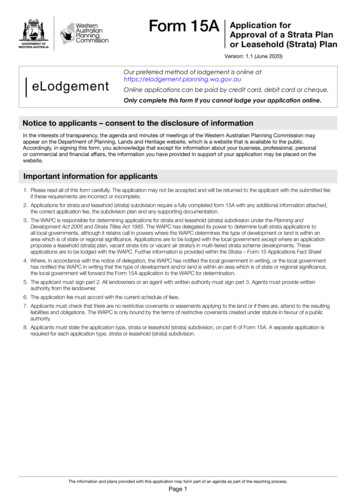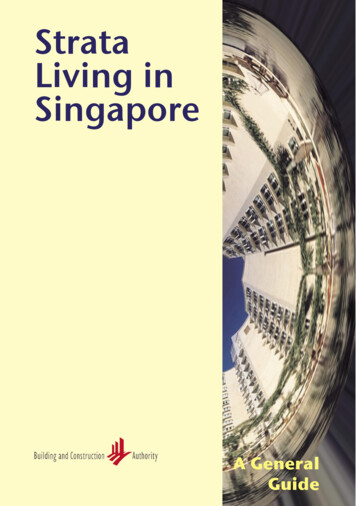
Transcription
StrataLiving inSingaporeA GeneralGuide
Strata Living inSingaporeA General Guide
DisclaimerWhile every effort is made to ensure the accuracy of information presented inthis publication, neither BCA nor its employees or any of BCA’s fellow stakeholders mentioned in this book can accept responsibility for any loss or damageincurred in connection with the use of the contents.Copyright 2005 Building and Construction Authority, SingaporePublished byBuilding and Construction Authority, Singapore5 Maxwell Road#16–00 Tower Block, MND ComplexSingapore 069110Telephone: 6325 7720Fax: 6325 4800Website: http://www.bca.gov.sgE-mail: bca enquiry@bca.gov.sgFirst published 2005All rights reserved. No part of this publication may be reproduced,stored in a retrieval system, or transmitted in any form or by anymeans, electronic, mechanical, photocopying, recording or otherwise,without the prior written permission of the publisher.Body text set in Slimbach 11/13 ptISBN No. 981–05–3217–2Design and edited by BOOKSMITH
AcknowledgementsThis guide has been produced by the Building and ConstructionAuthority (BCA) in collaboration with various stakeholders. Theyinclude the Association of Management Corporations in Singapore,Association of Property and Facility Managers, Real Estate Developers’ Association of Singapore, Singapore Institute of Surveyors andValuers and Colliers International Asset Management. BCA wouldlike to thank them for their enthusiastic support and invaluablecontributions in publishing this guide.
CONTENTS1Introduction1Share Value3Significance of share valueWhat does share value represent?Who determines share value?How the share value is determinedShare value in a staged developmentCan the share value of a strata lot be changed?2Duties and Responsibilities of theSubsidiary Proprietor6Contributions by subsidiary proprietorsMaintenance of lots and exterior featuresInter-floor leaksCompliance with noticesBy-lawsImprovements and additions to lots3Duties and Responsibilities of the Developer8Maintenance fundConstitution of the management corporationThe initial periodFirst annual general meeting4The Management CorporationResponsibilities of the management corporationElection of the council of the management corporationEligibility for election to the councilDuties of the office bearers of a councilRestrictions to the councilDisclosure of interests11
5Meetings15Meetings of the management corporationMeetings of the council6Maintenance Contributions19Contributions for maintenance and other expensesRecovery of maintenance contributionsVariation of contributionsRebates and incentives for early payment7Managing Agents21Appointment of the managing agentDuties and liabilities of the managing agentIndependent accreditation schemes for managing agents8By-Laws on the Use & Enjoyment ofCommon Property23Compulsory by-lawsMaking of additional by-lawsBreach of by-laws and remedyHouse rulesExclusive use by-laws9InsuranceInsurance by the management corporationInsurance by individual owners27
10Resolutions28Resolution by consensusComprehensive resolutionUnanimous resolution90% resolutionSpecial resolutionOrdinary resolutionSummary of resolutions11Resolving Disputes31Resolving disputes by talking to the other partySeeking mediationReferring disputes to a Strata Titles BoardReferral to the courts12Two-tier management corporation scheme33What type of property is eligible for two-tier MC schemesLimited common propertyWhat developments are suitable for a two-tier MC schemeFormation of a sub-MCFunction and administration of sub-MCsContributions by the subsidiary proprietors of a sub-MC13Staged Development36Staged development contract14Getting Information38Getting information from the management corporationGetting information from other sourcesGlossary42
Strata Living in Singapore – A General GuideINTRODUCTIONIn a densely populated and compact city-state like Singapore,many people live in strata-titled properties like apartmentsand condominiums. Such communities own, enjoy and areresponsible for the upkeep of common facilities like lifts, carparks, sport and recreational facilities (for example, swimmingpools, tennis courts, gyms and billiard rooms) in their estates.In the past, anyone who wishes to know more about thelaw relating to the maintenance of property and the managementof strata-titled property had to look up two separate pieces oflegislation—the Land Titles (Strata) Act (LTSA) and the Buildings and Common Property (Maintenance and Management) Act(BCPA).Today, relevant parts of the LTSA and the entire BCPA havebeen combined into a single legislation known as the BuildingMaintenance and Strata Management Act (BMSMA). This legislation is the outcome of extensive consultation with industryand the public, and is designed for ease of use and administration. New provisions such as staged development and two-tier1
Strata Living in Singapore – A General Guidemanagement corporation schemes have been introduced to theBMSMA as well as several existing provisions have been amendedto meet the needs of stakeholders such as yourselves.The purpose of this guide is to help laypersons—purchasers andowners—in understanding these new provisions as well as otherkey provisions in the BMSMA. To facilitate cross-referencing tothe BMSMA, the section number of the provisions are shownwithin parentheses, for example, [SECTION 62]. The publishershope that this guide will equip owners with some basic information on living in strata properties as well as help facilitatebetter management of their estates. However, this guide is notan exhaustive attempt to explain every detail and provision inthe BMSMA. Where appropriate and necessary, owners shouldstill seek and obtain independent legal or professional adviceon interpreting the provisions in the BMSMA.Building and Construction Authority2
1Strata Living in Singapore – A General GuideSHARE VALUEMy share valuecertificate isbigger becauseI have a biggerapartmentBefore buying a unit in a property, there are some important factors buyers shouldconsider like, among other things, price, location, tenure of land and quality ofthe development. It is also useful to find out the monthly contribution to themaintenance fund. In most cases, the contribution is proportional to the sharevalue of the unit.Significance of share valueThe share value of a property is a figure that represents the proportionate shareentitlement assigned to each strata unit in the same development. The purpose ofthe share value is to determine the amount of shares each owner has in relationto the other owners in the development.ExampleIf the share value of an apartment unit in a condominium is representedby the figure 5/350, then 350 represents the share value of all the unitsin the condominium and 5 is the share value allotted to the unit.3
Strata Living in Singapore – A General GuideWhat does share value represent?First, the share value determines the amount of contributions for maintenance thatan owner has to pay to the management corporation of the estate for maintaining the common areas in the development. Second, the share value of a strata lotdetermines the voting right of a unit owner. The higher the share value an ownerhas, the more voting rights he or she has. Third, the share value determines theshare that an owner has in the common property, which is jointly owned by allthe owners in a development.[SECTION 62]Who determines share value?To determine the share value of each unit, the developer submits a proposal to theCommissioner of Buildings (COB) for acceptance. This proposal shows the sharevalue that has been allocated by the developer to all the units in the development.A developer engages a professional surveyor to carry out the task of allocating theshare value. The share value of each unit must be accepted by COB before saleof property [SECTION 11].How the share value is determinedThe COB has a set of guidelines to assist developers to determine share value allotment. The general principle in allocating share value is based on perceived usageof common facilities. A unit that uses more of the common facilities is allotted witha higher share value and consequently contributes a higher maintenance levy.Share value in residential propertiesIn the case of residential properties, occupancy is taken into account because itreflects usage directly. Floor area groupings are used to take into account the different number of occupants, who are likely to stay in a unit. It is assumed thatunits within a larger floor area grouping have more occupants and thus incur ahigher proportion of maintenance costs of the common property. The floor areagroupings are shown in the table below.Floor areaShare value*50 m2 and below51 m2 to 100 m2101 m2 to 150 m2151 m2 to 200 m25678*The share value increases by one for every 50 m2 of floor area.4
Strata Living in Singapore – A General GuideShare value in mixed developmentsA mixed development can comprise residential units, offices and shops in onedevelopment. Some examples are Roxy Square, The Plaza, Sunshine Plaza andBurlington Square. In such developments, different weight factors are used toaccount for the unequal usage of common facilities among the different usergroups. Shops, which incur a higher percentage of maintenance expenses becausethey use more air-conditioning and other facilities like escalators, are allotted aproportionately larger share value. Shop owners therefore pay a higher levy thanowners of offices or residential units.Share value in a staged developmentA stage development is one that is built in a number of stages instead of simultaneously. The details must be disclosed in the staged development contract.If you have purchased a unit that is not part of a staged developmentcontract, the developer cannot change the share value allotted to your unit unlessyou give your consent [SECTION 12]. However, if your unit is part of a staged development, the share value allotted to your unit may be varied, within prescribedlimits, upon the completion of each stage of the development. This is spelt out inthe staged development contract between your developer and yourself. The stageddevelopment contract should also spell out any provisions in the event that theprescribed limits are exceeded.A developer who intends to carry out a staged development has to obtainapproval from the COB for the share value for all units (for current as well asfuture stages) before any unit in the first stage can be sold. The share value approved for subsequent stages is provisional. When each subsequent stage of thedevelopment has been finalised, the developer must file the share values of eachstage for approval before he can sell the units.Can the share value of a strata lot be changed?The share value of a strata lot cannot be changed once the strata title applicationis registered. However, the Registrar of Titles may allow changes to be made tothe share value in the following cases. Where there is an error in the entry Where the value has been fraudulently assigned to a lot Where there is a subdivision of a lot or an amalgamation of two ormore lots[SECTION 62]Alteration is also permitted if it has been provided for earlier under a staged development contract.5
2Strata Living in Singapore – A General GuideDUTIES AND RESPONSIBILITIES OFTHE SUBSIDIARY PROPRIETORContributions by subsidiary proprietorsA subsidiary proprietor (SP) is a purchaser to whom the developer has transferredownership of a unit, as shown on the strata certificate of title. Each SP is requiredto pay a certain amount of contribution to help maintain and manage the commonproperty of the development. This amount is levied by the management corporation (MC). If you don’t pay your contributions, the MC has a right to recoverany unpaid contribution from you as a debt [SECTION 40], or register it as a chargeagainst the strata lot [SECTION 43].Maintenance of lots and exterior featuresExterior features are permanent fixtures that are part of the external façade ofbuildings. These include openable windows in your unit. It is your duty to maintain your lot, including external openable windows and pipes that are exclusivelyused by you. If you fail to maintain the exterior features of your lot and someoneis injured or some property is damaged because of it, you can face severe penalties,including a fine and jail. In fact, you can face the same penalties even if no damageis done because the Act covers potential as well as actual damage [SECTION 9].6
Strata Living in Singapore – A General GuideInter-floor leaksIf there is an inter-floor leak, you and your neighbour are required to jointly carryout an investigation to establish the cause of the leak and proceed with the repairworks. You should also both resolve the cost of repair. In cases like this, it is presumed that the leak has originated from the upper floor unit unless the owner canprove otherwise. Therefore, the owner of the upper floor unit cannot claim thatthe leak has not originated from a defect in his unit. He has to jointly investigatethe cause with his lower-floor neighbour and proceed with any repairs required.Compliance with noticesYou must comply with any notice served by a public authority in relation to themaintenance of your lot. If you fail to respond to such a notice, the MC may arrange to have the required works carried out and recover the costs incurred as adebt owed to the MC from you [SECTION 30].By-lawsThe by-laws prescribed in the regulations and those made by the MC are for thepurpose of controlling and managing the use or enjoyment of common propertyand the lot in a development. SPs and occupiers of strata lots are obliged to complywith these by-laws [SECTION 32].Improvements and additions to lotsIf you intend to carry out works on your lot that may result in an increase in thetotal gross floor area of the entire development, you will need to apply to andobtain a 90% resolution from the MC (please see Chapter 10 for the various typesof resolutions) [SECTION 37]. Examples of such works include roofing a privateenclosed space and putting a slab over a void in a unit. Depending on the typeof work done, you may also be required to obtain the consent of other approvingauthorities like the Urban Redevelopment Authority.7
3Strata Living in Singapore – A General GuideDUTIES AND RESPONSIBILITIES OFTHE DEVELOPERMaintenance fundThe developer of an estate is required to obtain written approval from the Commissioner of Buildings (COB) before collecting maintenance charges from purchasers[SECTION 18]. In addition, any collection must be paid into a maintenance fundestablished for such a purpose.The developer is required to pay maintenance charges for all unsoldunits as well as sold units that are not handed over to its purchasers when themaintenance fund is established. However, the developer is given a three-monthgrace period from issue of the Temporary Occupation Permit (TOP) before makingcontributions for unsold units and sold units not handed over.The developer is required to keep proper books of accounts, appoint anauditor to audit his accounts annually and file a certified true copy of the auditedaccounts to the COB. Within 28 days after the accounts have been audited, thedeveloper is required to make the audited accounts available for inspection bypurchasers for a period of two weeks [SECTION 17].8
Strata Living in Singapore – A General GuideConstitution of the management corporationA management corporation (MC) is automatically formed when the strata titleplan for the development is lodged with the Chief Surveyor and a strata title application is made to the Registrar of Titles, Singapore Land Authority. You as asubsidiary proprietor automatically becomes a member of the MC. The MC, beinga legal entity, may sue and can be sued [SECTION 24].The initial periodThe initial period refers to the period from the day the MC is constituted to the daywhen the first annual general meeting (AGM) is held. The maximum duration ofthe initial period is 12 months [SECTION 2]. During this period, the developer playsthe role of the council [SECTION 23].Once the MC is constituted, the developer is required to open a bank account in the name of the MC and pay into the account all the money he has collected for the maintenance fund and keep proper books of accounts so that theycan be conveniently and properly audited [SECTION 23].Restrictions during the initial periodDuring the initial period, the MC cannot do these unless approval is granted bythe COB. Amend, add or revoke the by-laws Grant an easement such as allowing the pipes of another developmentto pass through or a restrictive covenant Execute a transfer of common property or confer exclusive rights Make any contract that confers rights and control beyond the initialperiod Borrow money and give securities Appoint a managing agent to hold office beyond the initial period[SECTION 49]Permitted alteration to common property during the initial periodDuring the initial period, the MC may carry out alteration to or erection of anystructure on common property only through a special resolution [SECTION 50].First annual general meetingThe first AGM must be convened within one month after the end of the initialperiod or six weeks after the developer receives a written request from the subsidiary proprietors of at least 10% of the total number of lots in the development.9
Strata Living in Singapore – A General GuideA notice must be served to each eligible SP together with a copy of the agendaof the AGM.If the developer does not convene the first AGM within the specified period, any SP or mortgagee in possession of a lot may apply to the COB to orderthe appointment of a person to convene the first AGM. The bottom line here isthat there must be an AGM after the initial period.Agenda of the first AGMThe agenda of the first AGM must include the following. To elect a council To determine the amount of contributions for the management fundand sinking fund To decide whether insurances effected by the developer should bevaried or extended To decide the matters that are to be determined only at a general meeting To appoint a managing agent and to determine the powers, duties orfunctions of the MC to be delegated to the managing agent To adopt the audited account from the date the MC is constituted andending on a date not earlier than four months before the first AGM[SECTION 26]10
4Strata Living in Singapore – A General GuideTHE MANAGEMENT CORPORATION,So much paper so little time. Haveto get another assistantThe Building Maintenance and Strata Management Act (BMSMA) empowers themanagement corporation (MC) of each development to control and manage thecommon property. The spirit of the BMSMA is for each MC to exercise self-governance and manage its own domestic affairs.Responsibilities of the management corporationEvery MC is required to keep accounting records and financial statements for atleast seven years. The books and accounts of the MC must be audited for eachfinancial year. The MC is also required to keep proper records of all notices itreceives or court orders served to it. It must keep notices and minutes of its meetings, including details of motions passed, as well as copies of all correspondencereceived and sent, and any other documents. All records must be kept for at leastseven years after the completion of each transaction [SECTION 48].Another responsibility of the MC is to prepare and keep a strata roll. Essentially, the strata roll is a register of the owners of each unit in the development.The information recorded in a strata roll includes the following. The share value of each lot The name and address of each subsidiary proprietor (SP) The name and address within Singapore of each mortgagee of a lot11
Strata Living in Singapore – A General Guide The name of the nominee of any company that is the SP or mortgageeof the lot The discharge, transfer, assignment or sub-mortgage of any mortgageof a lot The entry into possession of the lot by a mortgagee The address within Singapore for the service of notices on any personas shown in a notice given to the MC[SECTION 46]Election of the council of the management corporationThe council of the MC is a representative body of members elected from amongSPs or their nominees. It administers the day-to-day running of the strata schemeand is elected at each annual general meeting (AGM).The council can have up to 14 members, which includes representativemembers of an executive committee of a sub-MC. The executive committee of asub-MC is similar to the council of the main MC. (Please see Chapter 12 for moreinformation on sub-MCs.) Out of these members, three are to be appointed asoffice bearers: the chairman, the secretary and the treasurer [SECTION 53]. If theoffice bearers are not appointed at an AGM, the members of the council will appoint them at the first council meeting [SECTION 55].Eligibility for election to the councilTo be eligible for election to the council, you have to be at least 21 years oldand: an SP; or a nominee who is an immediate family member of an SP that nominates him or her; or a nominee of an SP that is a company.You must also not be in arrears of contributions three days before the election.Ownership of one lot entitles you to nominate one person for election. Ifyou own two or more lots, you are entitled to nominate more persons for election,in proportion with your share value but not more than 49% of the total numberof council seats.ExampleIf the total number of seats in the council is 10 and you own five lots,with a total share value that is less than 20% of all lots in the wholedevelopment, you may nominate only one candidate (yourself or oneother eligible person) for election to the council, provided you or another nominee are not already a member of the council.12
Strata Living in Singapore – A General GuideBut if the total share value of your five lots falls anywhere between20% and 40% of that of the whole development, you may nominatebetween two and four candidates (which may include yourself),proportionate to the actual total share value for the five lots. But youcannot nominate anymore if you and your other nominees alreadyoccupy that number of seats in the council.If the total share value of your five lots makes up 50% or more of thewhole development, you can still nominate up to only four candidates(which may include yourself). But you cannot nominate anymore if youand your other nominees already occupy four seats in the council.[SECTION 53]Duties of the office bearers of a councilThe chairmanThe chairman’s primary function is to preside over all meetings of the counciland the MC to ensure that the meeting is properly conducted. The chairman mayrule whether a particular motion is in order. However, in the event of a tie, thechairman does not have a second vote to break the tie.The secretaryThe duties of the secretary include the following. Preparing and distributing minutes of meetings Giving notices for the MC and the council that are required under theBMSMA Maintaining the strata roll Facilitating the inspection of MC’s documents by a person Answering correspondences addressed to the MC Convening meetings of the MC and the council (apart from its firstAGM) Carrying out all administrative and secretarial duties for the MC andthe council[SECTION 56]The treasurerThe duties of the treasurer include the following. Giving SPs notice of any levies under the BMSMA Giving receipts, carrying out banking errands and accounting for anymoney paid to the MC13
Strata Living in Singapore – A General Guide Preparing any financial certificates under the BMSMA Keeping all accounting records and preparing financial statements[SECTION 57]No person can hold the post of treasurer for more than two consecutive terms[SECTION 55]. MCs comprising not more than ten lots can exempt themselves fromthis requirement by passing a resolution by consensus under the Building Maintenance and Strata Management (Exempt Treasurers) Order.Restrictions to the councilThere are certain matters that cannot be decided by the council. These includethe following. Matters that must be decided by a general meeting (that is, those requiring ordinary resolution, special resolution, 90% resolution, unanimousresolution, comprehensive resolution or resolution by consensus)[SECTION 58] Matters that have been decided by the general body to put a restrictionon the council [SECTION 59]Disclosure of interestsIf you are a council member and you are, directly or indirectly, interested in entering a contract or proposed contract with the MC, you must immediately after thefacts are known declare the nature of your interest at a meeting of the council. Youmust not take part in any discussion or vote on any matter related to the contract.You may also be asked to withdraw from the meeting when the matter is beingdiscussed, unless the council requires you to be present to provide information[SECTION 60]. Besides the need to disclose any conflict of interests with their duties, council members must also act honestly and use reasonable diligence in thedischarge of their duties [SECTION 61].14
5MEETINGSStrata Living in Singapore – A General GuideMeetings of the management corporationAnnual general meetingsAfter the first annual general meeting (AGM), subsequent AGMs must be held ineach calendar year and not more than 15 months after the date of the last AGM[SECTION 27].AGM agendaThe agenda for an AGM should deal with at least the following items. The election of council members A motion for the adoption of the financial statement for the past financial period A motion to confirm the minutes of the last general meeting Other motions for consideration, submitted by the council or subsidiary proprietors (SPs)15
Strata Living in Singapore – A General GuideExtraordinary general meetingsAny general meeting of the MC that is not an AGM is called an extraordinarygeneral meeting (EOGM). An EOGM can be convened at any time to consider anymatter of concern to the council or SPs.There are two ways for convening EOGMs. By the majority vote of the council [SECTION 27] By giving a written notice to the secretary of the council asking forthe meeting to be held. The party or parties giving the notice mustcomprise people entitled to vote who together hold at least 20% ofthe total share value of all the lots or who make up at least 25% ofthe total number of all SPs [1ST SCHEDULE, PARA. 14].Requesting for a motion to be included in the agendaAny person entitled to vote at a general meeting can ask for a motion to be includedin the agenda for a general meeting. Written notice must be given to the secretaryof the council. The secretary must include the motion on the agenda for the nextgeneral meeting [1ST SCHEDULE, PARA. 12].Notice of meetingsEvery notice for a general meeting must contain the following.The place, day and hour of the meetingEach proposed resolution for consideration at the meetingAny other business for consideration at the meetingA copy of the minutes of the last general meeting for SPs who havenot been given a copy before Information notifying each person to whom the notice is being addressed that he may vote on each resolution and, where relevant, onthe election of members of the council In addition, every notice of an AGM must have the following. A copy of the statement of accounts of the MC and a copy of the auditor’s report of the account of the MC A motion for the adoption of those accounts A motion for the termination of any managing agent (MA) or for thecontinuation of the MA for the next financial year[1ST SCHEDULE, PARA. 1]Depending on the motion to be passed, notices must be given to each SPlisted on the strata roll. A motion to be decided by an ordinary resolution requiresat least 14 days’ notice before the meeting. All other motions require notices of atleast 21 days.16
Strata Living in Singapore – A General GuideQuorumA quorum is the minimum number of people at a meeting before binding decisions can be made. In an AGM, a quorum is formed if the number of SPs presentat the meeting, either in person or by proxy, together own at least 30% of the totalshare value of all the lots. There must be a quorum at a general meeting beforeany motion can be voted on.If there is no quorum within half an hour of the time fixed for the meeting,the meeting may be held as if there is a quorum if two or more SPs are present inperson. However, this “half-hour” rule does not apply to a general meeting thatis initiated from a requisition by SPs [1ST SCHEDULE, PARA. 3].Persons entitled to vote at general meetingsGenerally, to be eligible to vote at a general meeting, you must first not owe anydebt to the MC and you must satisfy one of the following. An SP or a mortgagee in possession or a receiver of a lot shown onthe strata roll A first mortgagee of a lot provided the SP of that lot does not cast avote A joint SP or co-mortgagee who is the more senior one according tothe order of the names recorded in the strata roll The first SP of a lot which is held by two or more persons in succession An SP who is a trustee of a lot An appointed proxy[1ST SCHEDULE, PARA. 2]ProxiesA proxy is a person whom you have given permission to represent you at a meeting. In an AGM, you can make anyone your proxy. You or your duly authorisedattorney have to appoint your proxy in writing. Where a company wishes to appointa proxy, the appointment has to be under seal or under the hand of an officer orattorney authorised to do so [1ST SCHEDULE, PARA. 17].The form appointing the proxy, together with any document that representspower of attorney, must be deposited at the registered address of the MC at least48 hours before the time fixed for the meeting [1ST SCHEDULE, PARA. 18].Meetings of the councilCouncil meetings are
These include openable windows in your unit. It is your duty to main - tain your lot, including external openable windows and pipes that are exclusively used by you. If you fail to maintain the exterior features of your lot and someone is injured or some property is damaged because of it, you can face severe penalties, including a fine and jail.
